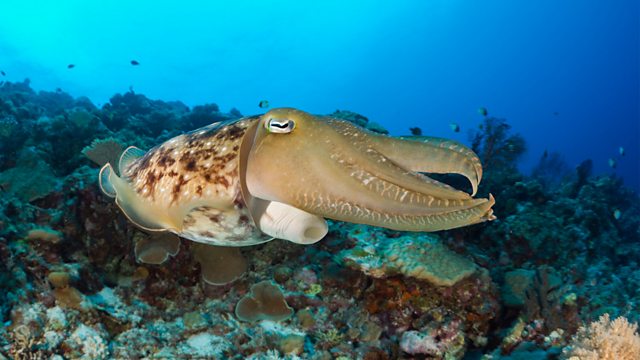Cephalopods
Melvyn Bragg and guests discuss the remarkable biology of octopus, squid, cuttlefish and nautilus, from jet propulsion to changing colour, and what makes them so adaptable.
The octopus, the squid, the nautilus and the cuttlefish are some of the most extraordinary creatures on this planet, intelligent and yet apparently unlike other life forms. They are cephalopods and are part of the mollusc family like snails and clams, and they have some characteristics in common with those. What sets them apart is the way members of their group can change colour, camouflage themselves, recognise people, solve problems, squirt ink, power themselves with jet propulsion and survive both on land, briefly, and in the deepest, coldest oceans. And, without bones or shells, they grow so rapidly they can outstrip their rivals when habitats change, making them the great survivors and adaptors of the animal world.
With
Louise Allcock
Lecturer in Zoology at the National University of Ireland, Galway
Paul Rodhouse
Emeritus Fellow of the British Antarctic Survey
and
Jonathan Ablett
Senior Curator of Molluscs at the Natural History Museum
Producer: Simon Tillotson.
Last on
LINKS AND FURTHER READING
Giant squid: from the deep sea to display - Natural History Museum
Wikipedia – Cephalopod
Peter Boyle and Paul Rodhouse, Cephalopods: Ecology and Fisheries (Wiley-Blackwell, 2005)
Peter Boyle (ed.), Cephalopod Life Cycles: Volume 1: Species Accounts (Academic Press, 1984)
Peter Boyle (ed.), Cephalopod Life Cycles: Volume 2: Comparative Reviews (Academic Press, 1987)
Richard Ellis, The Search for the Giant Squid (Penguin, 1999)
Peter Godfrey-Smith, Other Minds: The Octopus, The Sea, and the Deep Origins of Consciousness (Farrar, Straus and Giroux, 2017)
Roger T. Hanlon and John B. Messenger, Cephalopod Behaviour (Cambridge University Press, 1998)
Frank W. Lane, Kingdom of the Octopus: The Life History of the Cephalopoda (Pyramid Publications, 1962)
Jennifer Mather, Roland C. Anderson and James B. Wood, Octopus: The Ocean’s Intelligent Invertebrate (Timber Press, 2010)
China Mieville, Kraken (Pan, 2011)
Marion Nixon and John Z. Young, The Brain and Lives of Cephalopods (Oxford University Press, 2002)
Mark Norman, Cephalopods: A World Guide: Octopuses, Argonauts, Cuttlefish, Squid, Nautilus (ConchBooks, 2000)
Danna Staaf, Squid Empire: The Rise and Fall of the Cephalopods (ForeEdge, 2017)
Peter Douglas Ward, Natural History of Nautilus (HarperCollins, London, 1987).
Wendy Williams, Kraken: The Curious, Exciting, and Slightly Disturbing Science of SquidΒ (Abrams, 2011)
Credits
| Role | Contributor |
|---|---|
| Presenter | Melvyn Bragg |
| Interviewed Guest | Louise Allcock |
| Interviewed Guest | Paul Rodhouse |
| Interviewed Guest | Jonathan Ablett |
| Producer | Simon Tillotson |
Broadcasts
- Thu 1 Feb 2018 09:00Βι¶ΉΤΌΕΔ Radio 4
- Thu 1 Feb 2018 21:30Βι¶ΉΤΌΕΔ Radio 4
Featured in...
![]()
Science—In Our Time
Scientific principles, theory, and the role of key figures in the advancement of science.
In Our Time podcasts
Download programmes from the huge In Our Time archive.
The In Our Time Listeners' Top 10
If you’re new to In Our Time, this is a good place to start.
Arts and Ideas podcast
Download the best of Radio 3's Free Thinking programme.
Podcast
-
![]()
In Our Time
Melvyn Bragg and guests discuss the ideas, people and events that have shaped our world.



